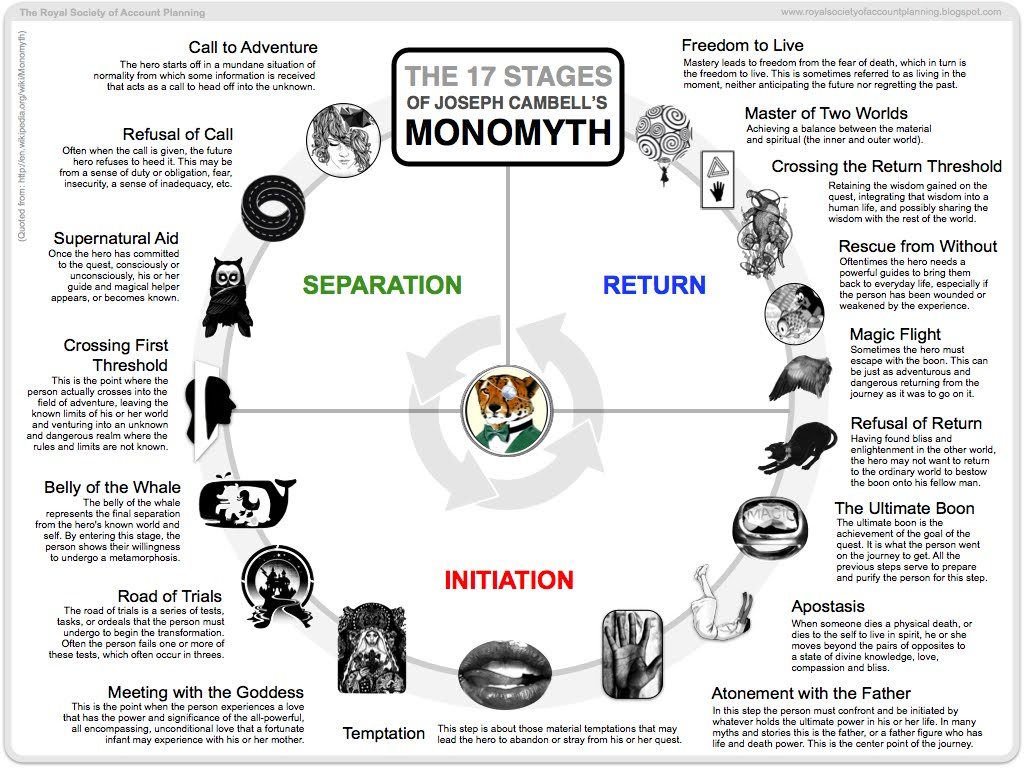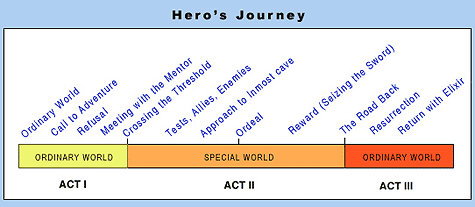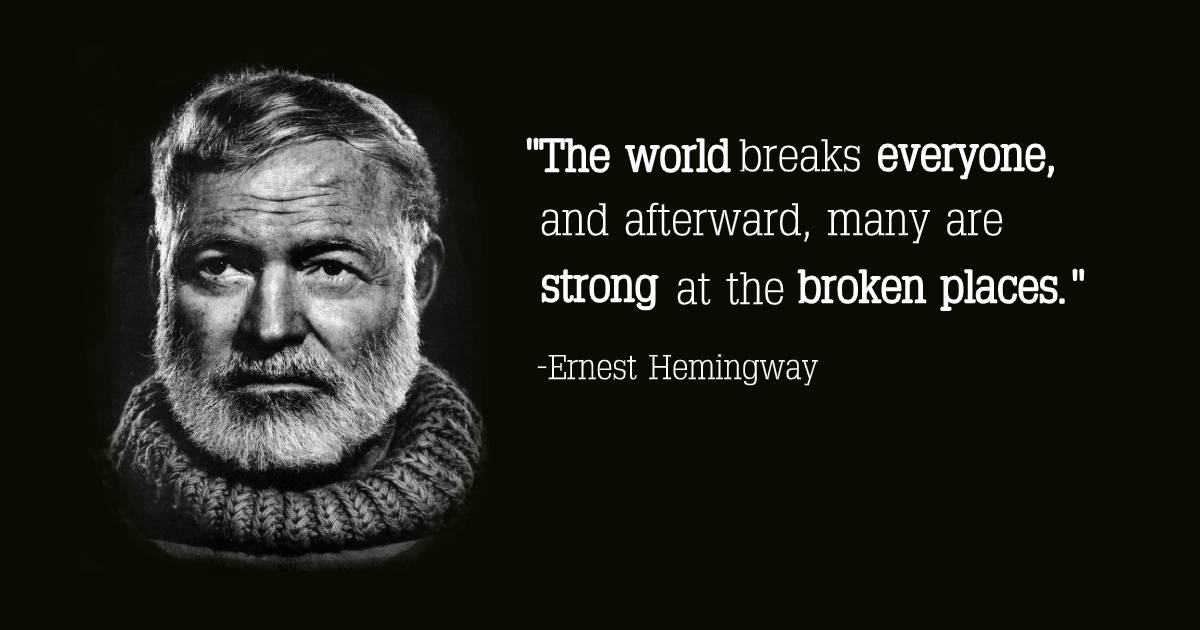Many of us in education have always fashioned ourselves as change agents. We have spent our entire careers advocating for some very core concepts. They usually relate to relevance, agency and pedagogy. We have been excited at times about the changes occurring, while simultaneously being disappointed in the slow pace or missed opportunities. We love that we have such great education technology, but are also frustrated that too many are doing the same old worksheet digitally. We love that project-based learning is being done in some places, while surprised that others have yet to even attempt anything related to deeper learning. It’s this constant tug-o-war that often leaves us hopeful and inspired, while also exhausted and cynical.
So, for any educators that feel this dilemma, I think I have yet another way to reflect and examine the situation. I believe that many of us are eternally part of a long admired literary model. Yes, we are smack dab in the middle of The Hero's Journey . This is the classic story structure created by academic Joseph Campbell in 1949 as a means to explain how stories unfold. This journey refers to a majority of all tales in which a character ventures out to get what they need, faces conflict and then ultimately triumphs over adversity.
 First there is the Status Quo. That’s our traditional education system that is still the dominant paradigm - you know regular school. This is also often called the Ordinary World. But then there is the Call To Action or Call To Adventure. This call is about lifting the Hero (us in this case) out of their comfort zones. Here, we are generally confronted with a challenge we can’t ignore. This catalyst can take many forms. For educators, this can be witnessing the lack of success so often present in school, seeing frustrated students, working in outdated systems or attending a conference with new ideas. We may initially Refuse The Call as we think that it’s too large of a challenge or that the system is impenetrable. We then Meet the Mentor. In this education analogy of the Hero’s Journey, this can be that other educator, the right leader, a speaker at a conference or even the right book.
First there is the Status Quo. That’s our traditional education system that is still the dominant paradigm - you know regular school. This is also often called the Ordinary World. But then there is the Call To Action or Call To Adventure. This call is about lifting the Hero (us in this case) out of their comfort zones. Here, we are generally confronted with a challenge we can’t ignore. This catalyst can take many forms. For educators, this can be witnessing the lack of success so often present in school, seeing frustrated students, working in outdated systems or attending a conference with new ideas. We may initially Refuse The Call as we think that it’s too large of a challenge or that the system is impenetrable. We then Meet the Mentor. In this education analogy of the Hero’s Journey, this can be that other educator, the right leader, a speaker at a conference or even the right book.
We then Cross the First Threshold. This is when we first enter another world - The Special World. This is that initial journey into that new project, new technology, new instructional approach, new paradigm or new classroom environment. We are becoming committed to something new. We no longer see things the same way. We have accepted the 'call.' There is no returning to the Ordinary World. Next, we begin to experience Tests / Allies / Enemies. We meet resistance, stumbling blocks or barriers. These can be our local system or larger ones. Think required textbooks, overly emphasized standardized assessments, homework policies, school schedules, tech limitations or outdated tech restrictions. We begin to lean on our Allies. These are our colleagues that have also entered the Special World. We sometimes work with them, but often we meet them outside our local systems. This occurs at professional learning gatherings, online on Twitter or maybe even in another professional outside of education. Or we are fortunate to work with those special, courageous leaders. We meet students, parents and others who embrace the new. Simultaneously, we encounter our Enemies. These can be individuals, groups or entities. These are colleagues who don’t want change or leave the Ordinary World. These can be policies or system expectations that don’t align with the change we seek.

 We then Approach to the Inmost Cave where we have our ultimate metaphorical encounter with the forces against us. We realize how difficult real educational reform is. It’s these moments where one might feel like surrendering or even leaving the profession altogether. We then reach the Ordeal. We are now at the apex. Campbell says this is the “belly of the whale.” We are confronting all of our professional fears in education and we must dig deep down to see if we can continue towards our individual or collective goals of change. This is where we may experience our most extreme objections, challenges, barriers or detractors. The system has survived much unchanged for many years.
We then Approach to the Inmost Cave where we have our ultimate metaphorical encounter with the forces against us. We realize how difficult real educational reform is. It’s these moments where one might feel like surrendering or even leaving the profession altogether. We then reach the Ordeal. We are now at the apex. Campbell says this is the “belly of the whale.” We are confronting all of our professional fears in education and we must dig deep down to see if we can continue towards our individual or collective goals of change. This is where we may experience our most extreme objections, challenges, barriers or detractors. The system has survived much unchanged for many years.
Then, we finally begin to experience Reward. We experience success. Our project gets great community feedback. Students are more engaged than ever. Parents say their students have never been this enthused about education. Students tell you that this is the best learning experience they have had. We then experience The Road Back where we realize despite some success, we have a long way to go. We get to Resurrection - possibly our final test. If we can push through these toughest times, we will prevail. This is where we see that new program, school, approach, major change on the brink of becoming a reality larger than ourselves. Finally, we Return With The Elixir. This is the triumph. Our definition of teaching and learning seems to be more accepted. We have others telling us that this is the right direction. We see our pedagogy getting support and more true believers. We may even see ourselves or fellow change agent colleagues get recognition, awards, speaking engagements, book deals or other adulation. We celebrate the change, the success and the apparent moving away from the Ordinary World.
 Although this story arc seems very prevalent in a majority of our stories, books and movies, the Hero’s Journey may be stuck in a repeat cycle for education. We seem to make the cliched one education step forward, then two giant education steps back. This last section of the journey - Reward, Road Back, Resurrection, Elixir - represents the part where many of us often get stuck. We may or may not experience the Reward and beyond. We are no longer in the Ordinary World, but are eternally stuck trying to get all of the Special World. This conflict is what makes all lifelong learners and change agents eternally frustrated. I hope those stuck in the Ordinary World finally get the Call To Action. Those of us fighting it out in the Special World need everybody.
Although this story arc seems very prevalent in a majority of our stories, books and movies, the Hero’s Journey may be stuck in a repeat cycle for education. We seem to make the cliched one education step forward, then two giant education steps back. This last section of the journey - Reward, Road Back, Resurrection, Elixir - represents the part where many of us often get stuck. We may or may not experience the Reward and beyond. We are no longer in the Ordinary World, but are eternally stuck trying to get all of the Special World. This conflict is what makes all lifelong learners and change agents eternally frustrated. I hope those stuck in the Ordinary World finally get the Call To Action. Those of us fighting it out in the Special World need everybody.
So, for any educators that feel this dilemma, I think I have yet another way to reflect and examine the situation. I believe that many of us are eternally part of a long admired literary model. Yes, we are smack dab in the middle of The Hero's Journey . This is the classic story structure created by academic Joseph Campbell in 1949 as a means to explain how stories unfold. This journey refers to a majority of all tales in which a character ventures out to get what they need, faces conflict and then ultimately triumphs over adversity.
We then Cross the First Threshold. This is when we first enter another world - The Special World. This is that initial journey into that new project, new technology, new instructional approach, new paradigm or new classroom environment. We are becoming committed to something new. We no longer see things the same way. We have accepted the 'call.' There is no returning to the Ordinary World. Next, we begin to experience Tests / Allies / Enemies. We meet resistance, stumbling blocks or barriers. These can be our local system or larger ones. Think required textbooks, overly emphasized standardized assessments, homework policies, school schedules, tech limitations or outdated tech restrictions. We begin to lean on our Allies. These are our colleagues that have also entered the Special World. We sometimes work with them, but often we meet them outside our local systems. This occurs at professional learning gatherings, online on Twitter or maybe even in another professional outside of education. Or we are fortunate to work with those special, courageous leaders. We meet students, parents and others who embrace the new. Simultaneously, we encounter our Enemies. These can be individuals, groups or entities. These are colleagues who don’t want change or leave the Ordinary World. These can be policies or system expectations that don’t align with the change we seek.
Then, we finally begin to experience Reward. We experience success. Our project gets great community feedback. Students are more engaged than ever. Parents say their students have never been this enthused about education. Students tell you that this is the best learning experience they have had. We then experience The Road Back where we realize despite some success, we have a long way to go. We get to Resurrection - possibly our final test. If we can push through these toughest times, we will prevail. This is where we see that new program, school, approach, major change on the brink of becoming a reality larger than ourselves. Finally, we Return With The Elixir. This is the triumph. Our definition of teaching and learning seems to be more accepted. We have others telling us that this is the right direction. We see our pedagogy getting support and more true believers. We may even see ourselves or fellow change agent colleagues get recognition, awards, speaking engagements, book deals or other adulation. We celebrate the change, the success and the apparent moving away from the Ordinary World.
Comments
Post a Comment